Ace Frehley and Slash on their love of the Les Paul, British blues-rock, and their unique approaches to the guitar
In this 2016 GW cover story, the two rock legends discuss how they came together for a raucous Thin Lizzy cover, and how they feel about their status as guitar heroes
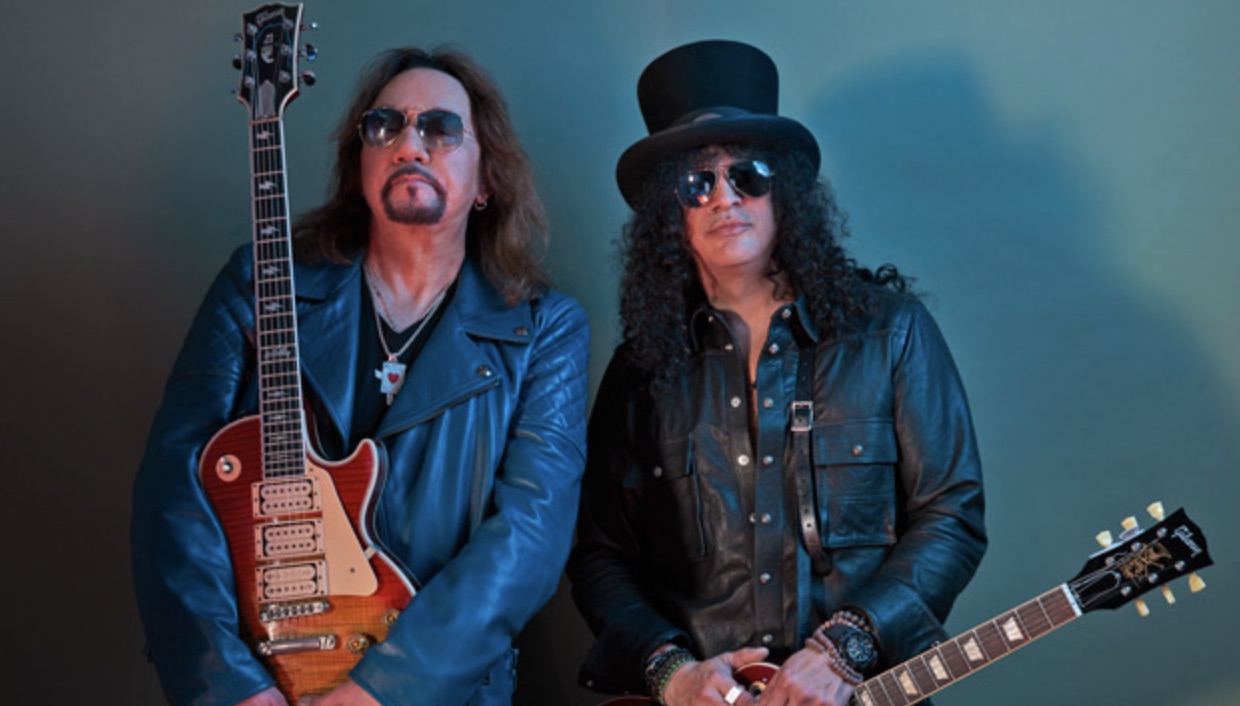
The following interview was featured in the June 2016 issue of Guitar World.
Southern California is in the grip of a hellish drought that has gone on for over four years now.
The City of Angels is burning. Wildfires rage uncontrollably as once-verdant lawns transform into Martian-like landscapes. But all of this changes on a Saturday afternoon the moment Ace Frehley steps out of his car and heads toward the entrance of the West Hollywood photography studio for a Guitar World cover shoot.
By the time he maneuvers his 64-year-old frame onto the sidewalk, a gathering gloom overhead turns the sky dark.
An ominous clap-and-rumble in the distance like a brutal double bassdrum fill sucks the air from your lungs. Ace is five steps from the doorway when the first, fat raindrops begin to fall.
His handler follows several steps behind him and scurries to reach cover so that the guitar case he is carrying – and what else could be in there but one of his signature Les Paul Customs? – doesn’t get wet.
This is an auspicious start to the day and though the Bronx street kid-turned-Kiss-icon is an hour late, he has brought heavy metal thunder with him and all is forgiven. In fact, nobody is too surprised that the Spaceman is running behind schedule at all.
Get The Pick Newsletter
All the latest guitar news, interviews, lessons, reviews, deals and more, direct to your inbox!
Origins Vol. 1, Frehley’s seventh solo album, a covers record celebrating the rock legends and songs that changed his life – including Jimi Hendrix’s Spanish Castle Magic, Led Zeppelin’s Bring It on Home, Cream’s White Room and others – was itself delivered three weeks behind schedule.
Space Invader, his 2014 solo record, was three months tardy – so it could be said that his time management is improving. Still, Ace has been trashing – or completely ignoring – the rules for a long time.
Ever since he first lit the fuse on the debut Kiss record, released more than 42 years ago, this Gibson devotee has been bringing his own sense of rebellious unorthodoxy to not only the electric guitar but just about everything else he does.
Dressed all in black, Ace enters Studio 1444 [formerly TTG Studios, a historic recording facility that once counted Jimi Hendrix amongst its clientele], and sees Slash is already in the house. They embrace warmly, exuding a palpable, comfortable familiarity.
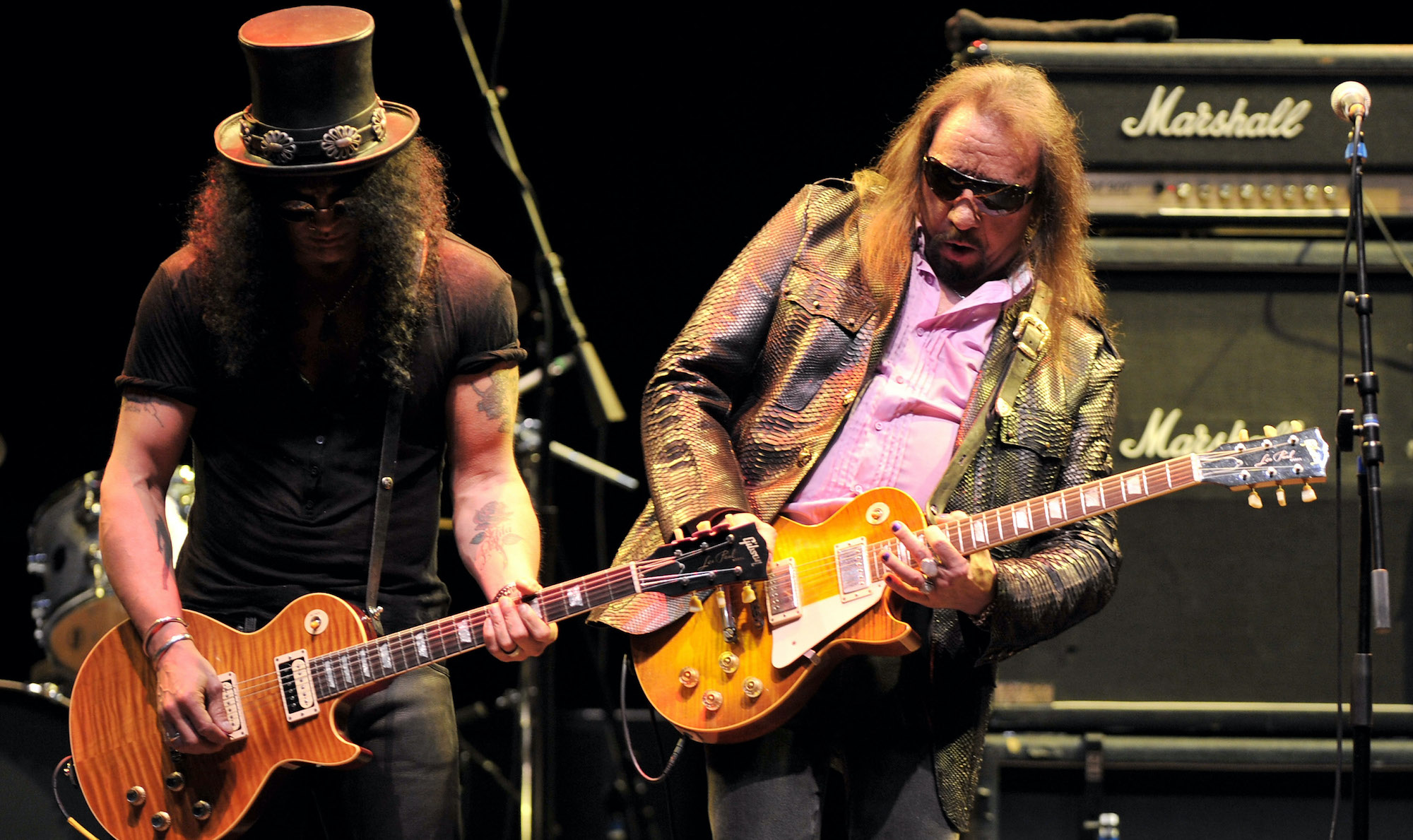
In this case, it is the meeting of two larger-than-life, balls-to-the-wall guitar giants. Rockin’ his trademark top hat, tennis shoes and tattoos, Slash is here today because he is one of the guest stars on Ace’s Origins Vol. 1, having contributed some nifty guitar work to a cover of Thin Lizzy’s Emerald. “I love that song and I’ve been threatening to play on an Ace record for the past two albums,” Slash says.
Besides Slash, Frehley has reached out to several other superstar friends for some assistance with Origins Vol. 1. Pearl Jam’s Mike McCready brings grunge-worthy guitar to a reimagining of the Kiss classic Cold Gin while Rob Zombie guitarist John 5 unleashes Telecaster madness on slamming versions of Jimi Hendrix’s Spanish Castle Magic and Kiss’s Parasite.
The starry-eyed Spaceman even reached out to former Kiss bandmate Paul Stanley, who turns in a surprisingly strong vocal turn on Free’s haunting Fire and Water.
“A covers album was the record company’s idea and I wasn’t that hot on it,” the ex-Kiss guitarist says. “When I started recording it in the very beginning, I was just going through the motions. Then I started getting some guest stars like Slash on the record and it started snowballing.”
When the photo shoot is over and the Les Pauls are packed away. Frehley and Slash retire to the upstairs lounge where an almost life-size photograph of Jimi Hendrix taken at this very studio hangs on one wall.
Jimi – de facto patron saint of Studio 1444 – beams down his beatific gaze upon two of his most ardent devotees and must be mad pleased in hearing that Ace is covering Spanish Castle Magic, but is probably thinking Rainy Day, Dream Away would have been more appropriate given the afternoon’s drought-busting downpour.
The two fabled fret kings assume comfortable positions on the sofa and settle in. As the rain increases in tempo outside, Ace and Slash find their own internal rhythms in trading verbal riffs with each other on the magic and mystery of electric guitars and about the masters who play them.
Did you play any of these songs from the Origins album way back in the day before you were in Kiss? Did you ever jam on White Room when you were still playing in garage bands?
Ace Frehley: "Absolutely. Cream was one of my first concerts. I saw them opening up for Mitch Ryder and the Detroit Wheels at a Murray the K show [concerts in the late Sixties hosted by the famed DJ]. The Who were on that show too."
Cream was a big influence on you?
Frehley: "Yeah, Cream and Eric Clapton; Led Zeppelin obviously and Jimmy Page. Jeff Beck. Pete Townshend and the Who."
Slash: "Definitely early Eric Clapton, Jeff Beck and Jimmy Page. Early Aerosmith and Angus Young pretty much all through the AC/DC stuff. The list could go on and on. The reason they’re guitar heroes is because they have an individual identity and you really hear the personality in their playing.
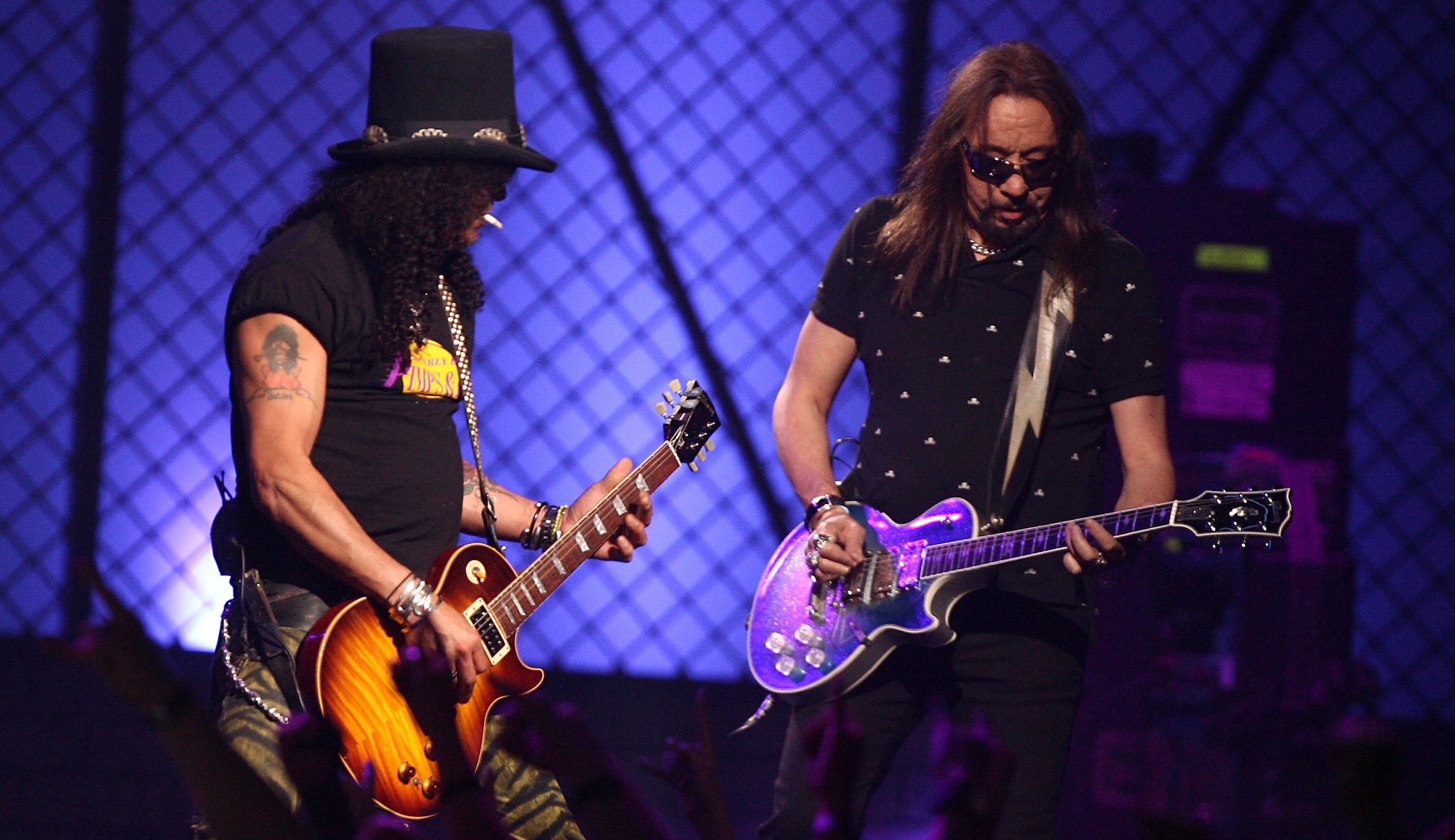
"Each one of these guys I would consider to be really memorable rock and roll guitar players, all have a defined personality in their style and as individuals and that’s what we attach ourselves to. That’s gone by the wayside over the years but it’s something I’ve always related to. Jimi Hendrix – that was a big one."
Frehley: "The Hendrix song was one of the biggest surprises of the record. John 5 came over and we did Parasite first and that came out great. Then John goes to me, 'What about Spanish Castle Magic?' I didn’t know how to play the song yet. He played a great guitar part and did some solos and I did some solos."
You brought in Slash to play on Emerald by Thin Lizzy. Were you a Thin Lizzy fan?
Frehley: "I loved Thin Lizzy. Emerald was always a song I thought was really challenging with the heavy riffing and the breakdown with the dual leads and stuff. The first person I thought of was Slash."
Slash: "I said, 'Why don’t we do it live and play back and forth right here in the moment?' The old-school way is the way I always try to do it. Sometimes with modern recording you have to do it more piecemeal but whenever I can do things in a more spontaneous and live setting, I do. Ace is old-school so it was no problem.”
Though you and Slash both plugged into Marshalls with Les Pauls, it was so cool to hear how different your guitar tones came out and how differently you both played.
Frehley: "No two guys play exactly alike. Slash has his style and I have mine even though we both play Les Pauls. I think both sounds came out great. I mean he just did some amazing leads on that song and blew me away."
Slash: "I don’t know what it is that I do. I don’t know if I could stand back from it. I know there are certain things I do that are very identifiable to me – I hit hard or I attack hard. The vibrato thing is something I don’t know anything about. I’m very keen on intonation and stuff like that.
"It’s something I learned early on because I really hate bad intonation in lead guitars. It drives me insane. But I don’t know too many different combinations of things that I do that I could really stand back and go, 'Well, you have to do this and this and this.' I’m way too insecure a guitar player to even go there!"
Nobody plays like you because you have this very unorthodox style that nobody can really copy. Your approach is so different and strange that that became your signature. Does that make sense?
Frehley: "Yeah. I can’t read music. I think at this juncture, it works to my advantage because I don’t sound like guys who [are schooled]. There are so many people when I show them how I play certain parts in a song, they go, 'I would have never played it that way.'
"It’s probably the wrong way. If you were with a guitar teacher he’d say, 'No, you don’t play it that way. You play it this way.' But I’ve always played things just however they come out."
Slash: "I just do what I do and have been doing that for as long as I’ve been playing. I’m aware of what guys do nowadays, which is technical showmanship and they write everything out and it’s all very calculated and it ends up sounding really bitchin’ on the record. But I have never subscribed to that method.
"If the inspiration is there it’s great and if it’s not hopefully you’re a good enough player to put it together as best as you can in the moment as opposed to thinking it out. The guitarists that influenced me, I’d like to think most of that stuff was improv and not totally calculated."
Ace, a huge part of your persona as a guitar hero came from the Les Pauls that lit up and spit out smoke during your Kiss days. Did all of that sort of pageantry and the huge show Kiss put on get in the way of your guitar playing?
Frehley: "The reality is it was true that the kind of show we put on did take away from our playing. The only time I could lick it out was when I played my solo alone. But even then when it starts to smoke, it did affect me a little. I couldn’t breathe too well and I might have missed a few notes.
"Put it this way: if I could have walked out onstage with jeans and a T-shirt and just stood there and played, I would have played better. I don’t think it would have been as exciting to the audience though unless they were all guitar players."
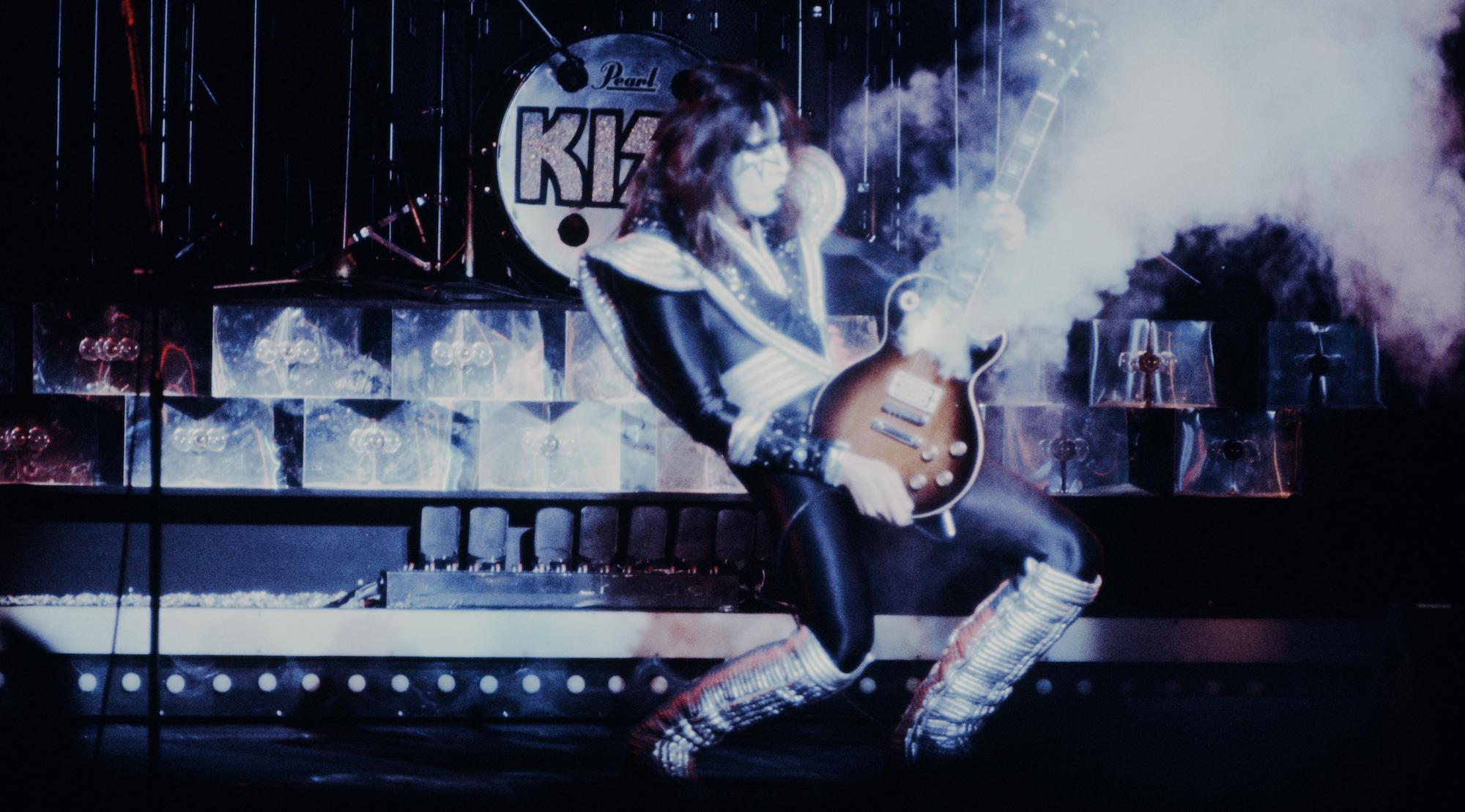
Talking about Kiss, this is the first time you’ve worked with Paul Stanley since the Psycho Circus album in 1998. Was he receptive to the idea of singing on Fire and Water?
Frehley: "I was very surprised. He was very receptive to my phone call and it was a really nice surprise working together. I got a lot of feedback with him. I sent him three or four rough mixes and that’s why I gave him production credit. We produced it together and it turned out great. His vocal is just outstanding."
Can you describe what you and Paul Stanley did as guitar players?
Frehley: "Paul’s a great rhythm guitar player and he came up with terrific rhythm patterns. I used to play octaves of his rhythm parts. I would try never to play the same register he’s playing. If he’s playing the E chord below, I’m playing it high. If he’s playing in the midrange, I’m playing low or high. That’s what made the songs sound thicker; by playing transpositions of the same chord."
Wasn’t Fire and Water a song you wanted to cut with Kiss?
Frehley: "I’ve wanted to cut that song since the Seventies. I’ve always thought it was a great song and it needed to be redone. Originally me and Paul were gonna do Little Wing and that didn’t work out. Then Paul said, 'What about My Generation by the Who?' and I said, 'That could work.'
"Then I sat around for a little while and Fire and Water just popped into my brain. I called back Paul and said, 'What about Fire and Water?' and he goes, 'Yeah, Fire and Water.' That’s just the way it happened. It was magical and all the planets aligned."
You really stepped up with your own vocals as well on the album.
Frehley: "I’m not really a virtuoso singer. Any song I can kind of talk through like a Stones song or something like that, I’m in good shape. [laughs]"
You cover a couple of Kiss songs – Cold Gin and Parasite – that Gene Simmons originally sang. Did you not sing those songs because you were unsure about your voice?
Frehley: "I was nervous. I never thought I was a lead singer and I still don’t consider myself a lead singer but a lot of people do. I’ve been singing Cold Gin since the Nineties live and Parasite, so finally people are gonna hear it on a CD."
Mike McCready from Pearl Jam guested on Cold Gin. What made you think of him?
Frehley: "My daughter Monique was a huge Pearl Jam fan. We went to see a Pearl Jam concert back in the Nineties and they really catered to us backstage. I didn’t realize Pearl Jam was such huge Kiss fans and Mike’s a big fan of mine.
"I ended up jamming with Pearl Jam at Madison Square Garden and we did Black Diamond one night. I jammed with them in Atlantic City at the Borgata Casino. I’ve been asking Mike for the last five years, 'Play something on one of my records.'"
Did you listen to grunge in general? Alice in Chains, Soundgarden and those types of bands?
Frehley: "Not a huge fan. I think some of their songs are really good and interesting but I’m a blues-based guitar player. I’m a rock guy. Blues, heavy, hard rock. I was brought up with Hendrix, Led Zeppelin, the Cream and the Who."
Slash: "The backbone of all rock and roll guitar is deeply rooted in the blues. I go back and listen to Albert and B.B. King. That’s the basis for even Eddie [Van Halen]. The really cool rock licks you hear any of these guys doing is just the blues delivered at a high velocity."
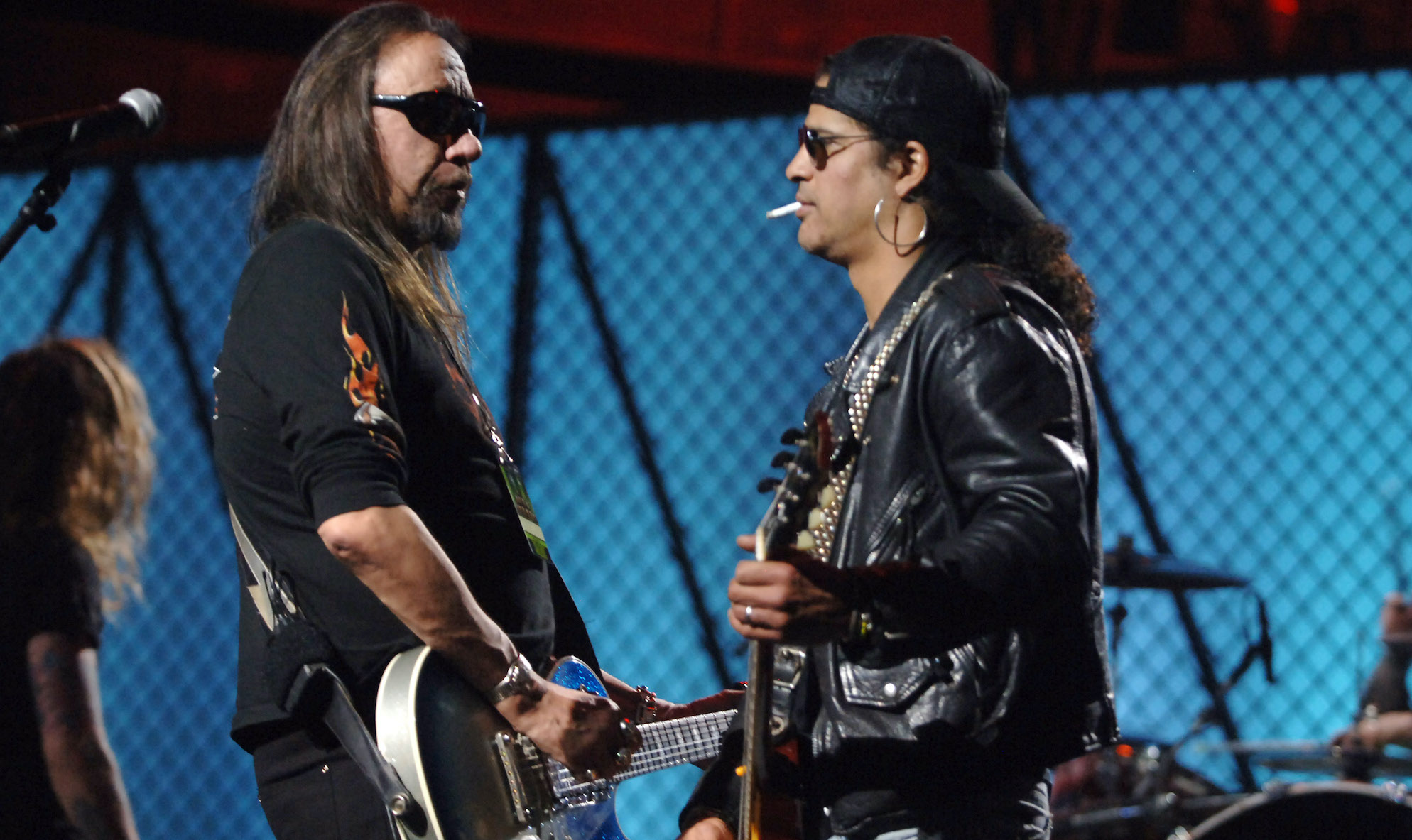
Do you think your guitar tone has improved over the years?
Frehley: "I don’t think my guitar tone has changed very much. It’s pretty much a Les Paul through a Marshall. If it ain’t broke, don’t fix it, right? I can’t sit there with 10 pedals like a lot of other guys do. It’s just too much fuckin’ processing."
You have both always been identified with the Les Paul. Did you first pick one up because your guitar heroes were playing them?
Frehley: "When I first joined Kiss, I was using a reverse Firebird with a single pickup and a 50-watt Marshall. The same exact reverse Firebird, single pickup, mini-humbucker Eric Clapton used on the Farewell Cream tour."
Slash: "I remember Whole Lotta Love being the biggest sonic influence on me way before I ever thought about picking up a guitar. I remember Zeppelin songs had a certain sound and I never thought about it at the time. When I picked up a guitar, I gravitated toward what Jimmy Page was doing as far as guitar sounds and style. I found out later that a lot of the stuff I liked was all humbuckers and Les Pauls."
Did you play that Firebird on the Kiss album?
Frehley: "No, I bought a Les Paul and a 100-watt Marshall once we got our advance money from Casablanca. I could never afford one and when Kiss got their first record deal, we all bought brand new equipment."
Slash: "The Les Paul is something that I gravitated toward from day one. It wasn’t even a real Les Paul [laughs]; it was a Les Paul knockoff. I liked that shape and the look of that guitar which I attributed to some of my favorite guitar players at that time who used Les Pauls.
"I remember recognizing Mike Bloomfield, Jeff Beck, Jimmy Page, Keith Richards and Mick Taylor. Joe Perry and Brad Whitford both had one. I was recognizing it on guitar players that I liked and I liked their sound because I didn’t know jack about guitars obviously."
Ace, when you were recording the Kiss album, did you have any idea about the profound influence you would have on the generation of guitar players to come?
Frehley: "Not really and I still don’t. I find I do my best work when I don’t think. I do my best solos that way. I don’t try to think about what I’m gonna play. I don’t say, 'Well, I’m gonna put this riff in on the fourth bar.' I just gotta let it go and that’s how I do my best work and it’s always been like that. If I don’t get a song in three or four takes I take a break because it loses all its spontaneity."
Slash, what about when you recorded Appetite for Destruction?
Slash: "I really don’t have a perspective on it either. It was not a preconceived thing and especially at that age where you’re just flying by the seat of your pants and not thinking about any of those things.
"All these years later, the one thing I do see is when I go out and sign autographs after gigs and you get the ultimate compliment, which is when somebody says, 'You were a major influence on my playing.' It’s really hard to grasp it and I can only go off of having thought the same way about Joe Perry or Jimmy Page."
Your choice of Bring It on Home from Led Zeppelin II was different. You don’t really hear that song being covered.
Frehley: "It was the only beginning part I could sing. [laughs] Led Zeppelin, man! I saw their first New York appearance at the Fillmore East opening up for Iron Butterfly. I really felt sorry for Iron Butterfly because after Led Zeppelin went off, half the audience walked out.
"Jimmy Page was a huge influence on me and you’ll hear a lot of Page throughout all my solos with Kiss intermingled with Hendrix, Clapton, Townshend and Beck. Those five guys were the guys that taught me how to play guitar just by copying their solos and moving their techniques around."
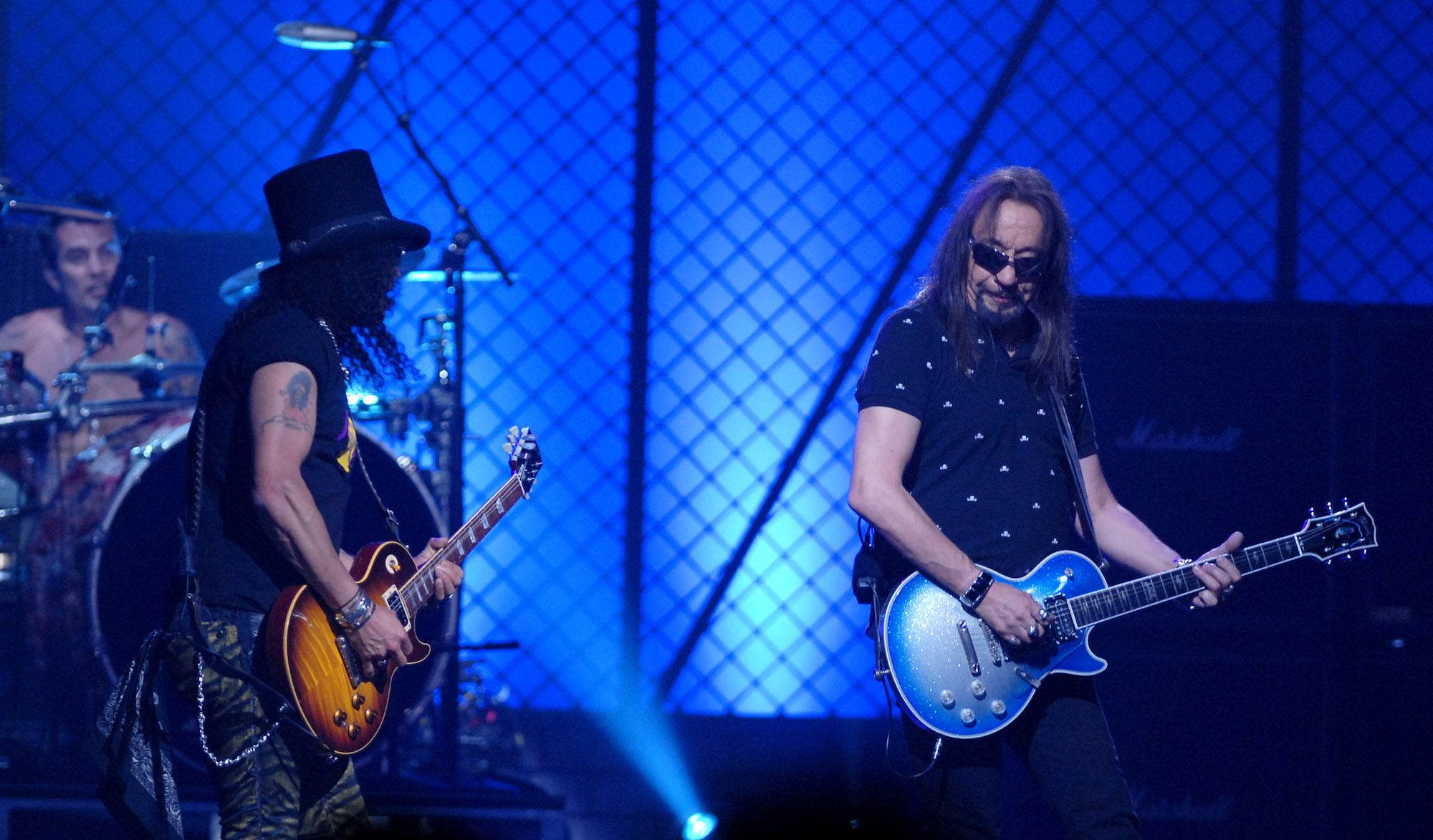
It’s incredibly difficult to think about your own legacy but you’ve had as much of a profound influence on other guitar players as Hendrix and Page had on you. Can you put that in perspective at all?
Frehley: "I know I’ve had a huge influence on thousands of guitar players. Every time I go somewhere, guys will come up to me and say, 'Man, if it wasn’t for you I would have never picked up the guitar.' But I kind of try to stay in the now. I don’t get wrapped up in all that history and dates.
"If I knew I was gonna influence that many guitar players over that span of time, I probably would have practiced a little more. The fact that some of my work is a little sloppy is okay. It’s not like the Stooges though. [laughs] I think it works for me that I’m not schooled. I play slightly unorthodox and I think it works to my benefit."
Do you have any sense of why so many guitar players have name checked you as one of their main influences?
Frehley: "I don’t really know exactly what they connected with but obviously they connected with something. I always had a good feel and good attitude.
"I mean sometimes I played sloppy and some of the solos were a little sloppy but I always had the attitude and the tone. ’Cause I’m not a schooled musician, I play things unorthodox and sometimes I play things that actually a schooled musician might say, 'Well, you’re playing that wrong,' and I go, 'There’s no right or wrong in rock and roll. You just do it. It’s all about feel and attitude.'”
“There’d been three-minute solos, which were just ridiculous – and knackering to play live!” Stoner-doom merchants Sergeant Thunderhoof may have toned down the self-indulgence, but their 10-minute epics still get medieval on your eardrums
“There’s a slight latency in there. You can’t be super-accurate”: Yngwie Malmsteen names the guitar picks that don’t work for shred
![A black-and-white action shot of Sergeant Thunderhoof perform live: [from left] Mark Sayer, Dan Flitcroft, Jim Camp and Josh Gallop](https://cdn.mos.cms.futurecdn.net/am3UhJbsxAE239XRRZ8zC8.jpg)








